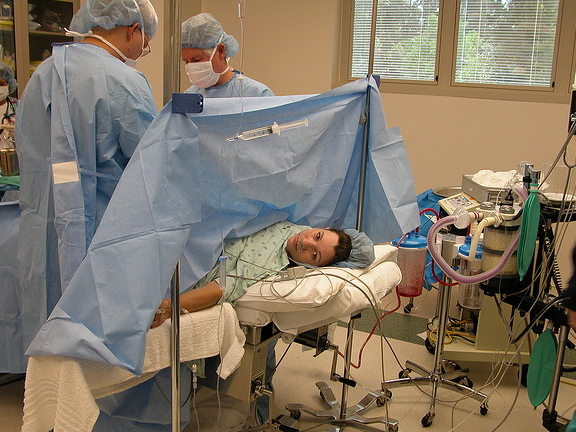
Shannon Brownlee will visit Zócalo July 6th to discuss the question “How Can We Take Charge of Our Health?“
Los Angeles doctors are plentiful, and Angelenos have some of the highest rates of visits to doctors and specialists in the nation. So you’d expect Angelenos to get the very best health care. But do they really?
Look at the numbers, and you might notice that Angelenos are getting a lot of health care, but they aren’t necessarily getting a whole lot of health. The Dartmouth Atlas of Health Care offers a snapshot of the care Medicare beneficiaries receive across the country. The statistics on who’s getting what are very different from place to place. Take the example of back surgery. For those suffering from all-too-common lower back pain, surgery isn’t always a good option. In fact, recent research suggests that other, more conservative options, such as physical therapy, are often much better for relief. Yet Medicare beneficiaries in Los Angeles are 40 percent more likely to undergo back surgery than residents of Fresno. And they are almost two and a half times as likely to have back surgery as residents of Honolulu, Hawaii.
 We see similar numbers when it comes to the treatment of an enlarged prostate. This is a common condition among older men and may be treated by transurethral resection or removal of the prostate (TURP). But other options for treatment exist, and while TURP may provide the greatest chance for relief of symptoms associated with an enlarged prostate, it also carries a greater chance of complications and side effects like incontinence and sexual impairment. In treatment-happy Los Angeles, men are almost twice as likely to undergo TURP for for an enlarged prostrate as men in Alameda, Calif. And they’re two and a half times more likely to undergo the surgery as men in Ogden, Utah.
We see similar numbers when it comes to the treatment of an enlarged prostate. This is a common condition among older men and may be treated by transurethral resection or removal of the prostate (TURP). But other options for treatment exist, and while TURP may provide the greatest chance for relief of symptoms associated with an enlarged prostate, it also carries a greater chance of complications and side effects like incontinence and sexual impairment. In treatment-happy Los Angeles, men are almost twice as likely to undergo TURP for for an enlarged prostrate as men in Alameda, Calif. And they’re two and a half times more likely to undergo the surgery as men in Ogden, Utah.
Does that mean Angelenos are reliably over-treated? Actually, no. Many who might benefit from hip replacements, for instance, aren’t getting them. Clinical trials have shown that about 90 percent of patients report being happy with their new hips and feeling better overall. Yet residents of Napa are 50 percent more likely to receive hip replacements than residents of Los Angeles.
The “right” rate of any procedure is going the one that is aligned with the preferences of well-informed patients. Often, patients just don’t know enough to make a sound decision. Los Angeles residents experience some of the highest rates of aggressive end-of-life care in the country, but is that really what they want? Medicare beneficiaries in their last six months of life who were treated at UCLA Medical Center saw an average of 11 different physicians and had 48 individual physician visits. Forty-four percent of those patients died while in the hospital. The cost to Medicare for the last two years of each of these patients’ lives totaled almost $100,000. The national average was just over $60,000.
Certainly, Medicare beneficiaries in Los Angeles appear to have little grounds for complaining about stinginess of treatment. But what’s less clear is whether they really wanted such aggressive medical attention. Were they given other options? And were patients undergoing back surgery or TURP informed about the potential risks as well as the possible benefits of these treatments? When looking at statistics for end-of-life care, how many patients really want to spend their last days of life in the ICU, tethered to machines? How many really want to see an endless stream of physicians? Asking what it is that patients want is particularly critical when it comes to questions about medical decisions that have obvious tradeoffs – those tradeoffs may be weighed very differently by different patients.
Patients deserve choices they understand and treatment they really want. That means we need to do a better job of helping patients get the information they need, when they need it. It also means doctors and patients should be sharing important medical decisions. Patients should be able to get the treatment they need, and no less. But they should also get only the treatment they want, and no more.
Shannon Brownlee is acting director of the Health Policy Program at the New America Foundation and the author of Overtreated: Why Too Much Medicine is Making Us Sicker and Poorer.
*Photo courtesy of Tammra McCauley.




Send A Letter To the Editors